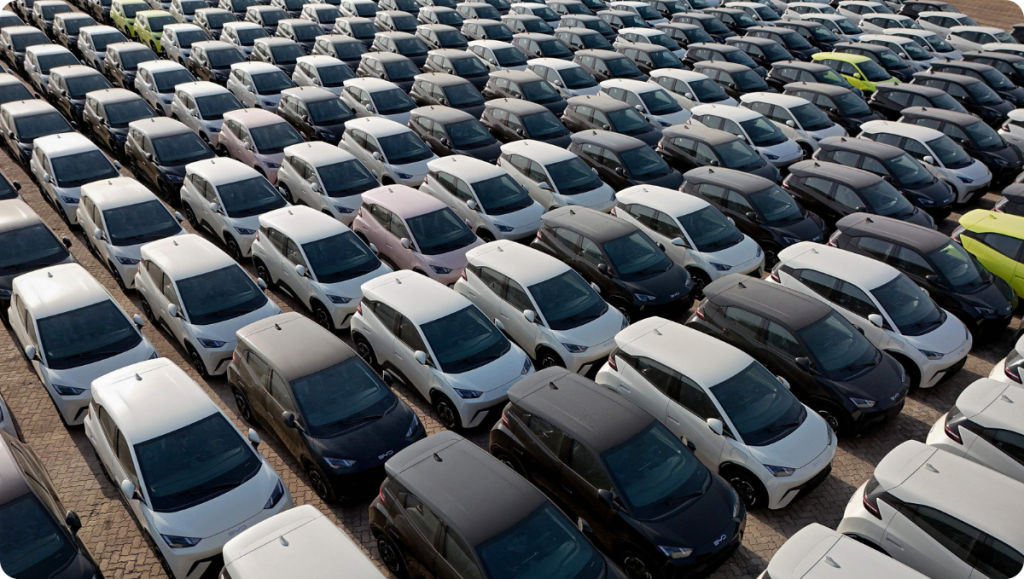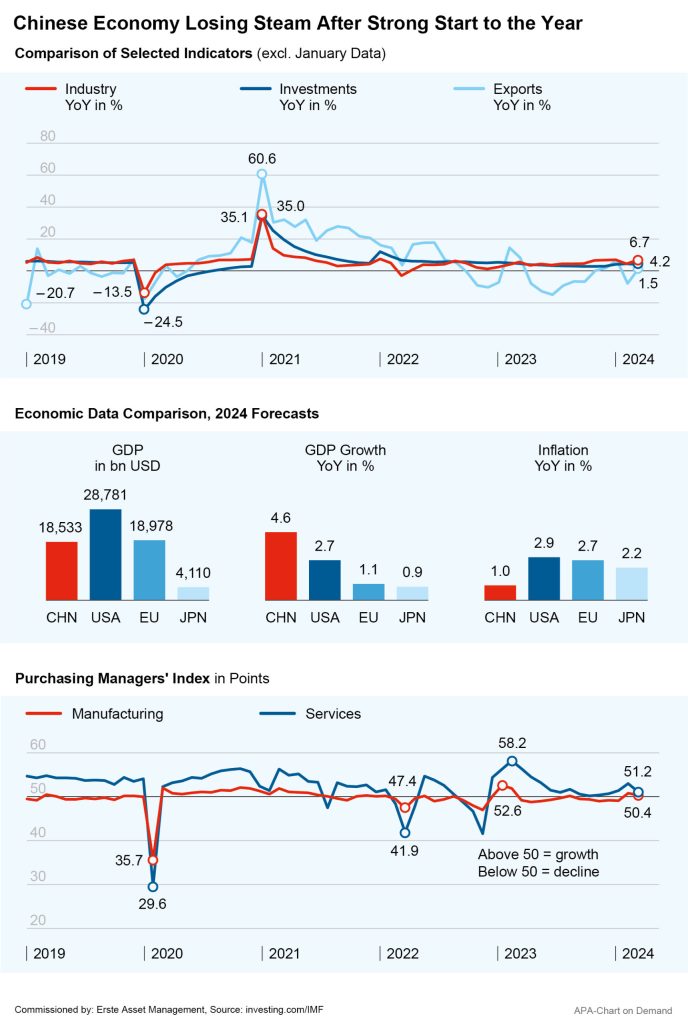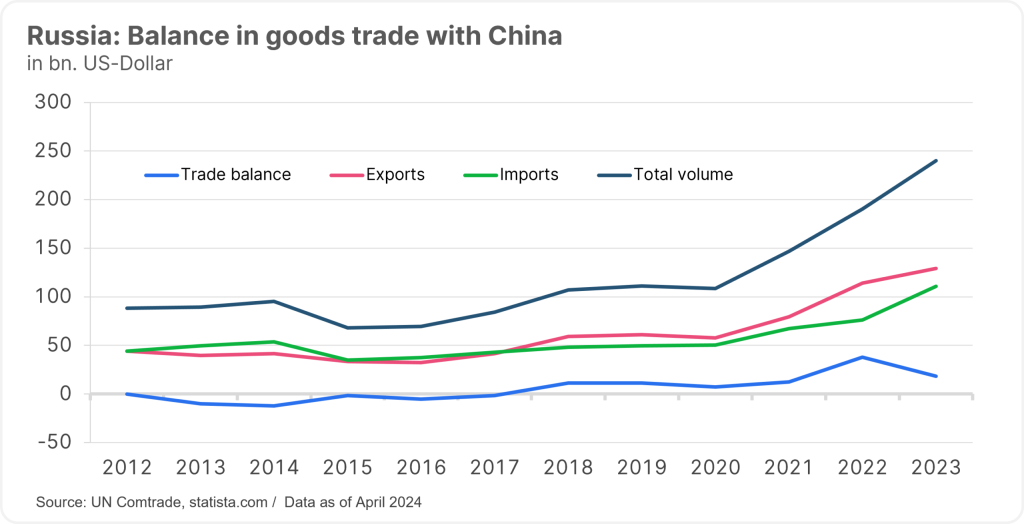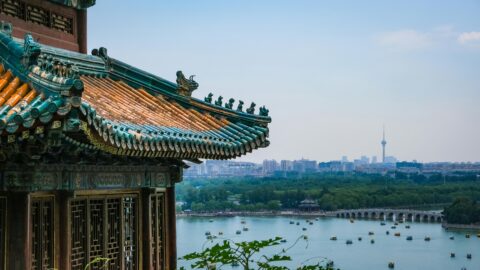
After a surprisingly strong start to the year thanks to booming exports, China’s economy recently faltered somewhat. The crisis on the property market, high youth unemployment and weak domestic consumer sentiment are contributing negative factors for the Chinese economy. And while the booming export industry is making up for the domestic weakness, the government’s aggressive export politics threaten to lead to a trade war with the West.
China’s economy grew by 5.3% in Q1, outperforming expectations. In the meantime, however, the growth may have lost some of its momentum, with even the 5%he International Monetary Fund (IMF) has cut back its growth expectations to 4.6% for 2024, after 5.4% in the previous year.
Bond Issues and Infrastructure Investments to Drive the Economy
China’s government has therefore recently increased its investment in infrastructure and is focussing on high-tech products to drive the economy. The country recently issued a government bond with a total volume of over USD 138bn to finance further infrastructure investments. China already exports large quantities of batteries, solar modules, semiconductors, electric cars and other industrial goods to the global market.

This measure is intended to keep the country’s industry going. In April, industrial production grew by a surprising 6.7%, well above the March figure of 5.5% and the forecast average, also 5.5%. By contrast, the Purchasing Managers’ Index for the manufacturing industry, a leading industry indicator, fell to 50.4 points in April from previously 50.8 points. While the index remains above the 50-point threshold, signalling growth, it also shows a slowdown in momentum.
Weak Domestic Consumer Sentiment
According to China’s statistics office, recent investment and retail sales have been weak. Investment outside the agricultural sector grew by 4.2% in the first four months, where, by the end of March, growth still lay at 4.5%. Retail sales grew by 2.3% in April, massively undercutting economists’ expectations of nearly 4% growth.
Poor domestic consumer sentiment is currently one of the economy’s biggest problems. However, so far, the country managed to compensate for this with a strong export economy: exports grew by 1.5% in April, following a slump of 7.5% in March.
Attempting to make up for weak domestic demand through foreign sales, many Chinese exporters have lowered their prices. China’s factories are currently producing at full speed for export; however, this is also exacerbating the trade dispute with the US and the EU. The West accuses China of anti-competitive practices, using state subsidies and flooding the markets with an abundance of goods. The cheap products are then deliberately directed towards the USA or Europe, Western heads of state maintain.

US Responds to Product Glut From China With Punitive Tariffs
The US therefore recently announced that it would impose special tariffs on a range of Chinese products such as batteries and electric cars. For electric cars, these will be increased from 25 to 100%, de facto blocking market entry for Chinese EVs in the US.
EU Commission President Ursula von der Leyen also warned of “tough decisions” from Brussels at her meeting with Chinese President Xi Jinping at the beginning of May if Beijing does not cease its anti-competitive practices. The EU would not allow its market to be “flooded” with state-subsidised goods from China. “The world cannot absorb China’s overproduction,” said von der Leyen.
China Expands Trade With Russia and Global South
China itself threatened further retaliatory measures in the trade dispute and is also relying heavily on its alliance partner Russia for trade. Thanks to goods from China, Russia can circumvent some of the Western sanctions.
According to the Munich-based Ifo Institute, the export restrictions imposed by the EU and other Western countries have resulted in a shortage of around a third of sanctioned products in Russia compared to before the war on Ukraine. “China is Russia’s most important alternative source for sanctioned products,” according to a recent study published by the institute. According to the study, 61% of all sanctioned products now come from China. In 2021, this share was only 35%. Although Chinese exports to Russia dropped by 10.8% in April, bilateral trade between China and Russia grew by 7.9% overall in the first four months of 2024.

Russia has also further consolidated its strong trade relations with the Global South. The People’s Republic’s share of economic exchange with 25 emerging and developing countries has risen from around 12 to 20% since 2010, as reported by Der Spiegel on the basis of an analysis by the Cologne-based German Economic Institute (IW). According to the report, China’s dominance in the region has increased further in recent years. Despite the coronavirus pandemic, the country’s trade with the Global South rose by 47% to more than USD 1.9tn between 2019 and 2023.
Legal disclaimer
This document is an advertisement. Unless indicated otherwise, source: Erste Asset Management GmbH. The language of communication of the sales offices is German and the languages of communication of the Management Company also include English.
The prospectus for UCITS funds (including any amendments) is prepared and published in accordance with the provisions of the InvFG 2011 as amended. Information for Investors pursuant to § 21 AIFMG is prepared for the alternative investment funds (AIF) administered by Erste Asset Management GmbH pursuant to the provisions of the AIFMG in conjunction with the InvFG 2011.
The currently valid versions of the prospectus, the Information for Investors pursuant to § 21 AIFMG, and the key information document can be found on the website www.erste-am.com under “Mandatory publications” and can be obtained free of charge by interested investors at the offices of the Management Company and at the offices of the depositary bank. The exact date of the most recent publication of the prospectus, the languages in which the fund prospectus or the Information for Investors pursuant to Art 21 AIFMG and the key information document are available, and any other locations where the documents can be obtained are indicated on the website www.erste-am.com. A summary of the investor rights is available in German and English on the website www.erste-am.com/investor-rights and can also be obtained from the Management Company.
The Management Company can decide to suspend the provisions it has taken for the sale of unit certificates in other countries in accordance with the regulatory requirements.
Note: You are about to purchase a product that may be difficult to understand. We recommend that you read the indicated fund documents before making an investment decision. In addition to the locations listed above, you can obtain these documents free of charge at the offices of the referring Sparkassen bank and the offices of Erste Bank der oesterreichischen Sparkassen AG. You can also access these documents electronically at www.erste-am.com.
Our analyses and conclusions are general in nature and do not take into account the individual characteristics of our investors in terms of earnings, taxation, experience and knowledge, investment objective, financial position, capacity for loss, and risk tolerance. Past performance is not a reliable indicator of the future performance of a fund.
Please note: Investments in securities entail risks in addition to the opportunities presented here. The value of units and their earnings can rise and fall. Changes in exchange rates can also have a positive or negative effect on the value of an investment. For this reason, you may receive less than your originally invested amount when you redeem your units. Persons who are interested in purchasing units in investment funds are advised to read the current fund prospectus(es) and the Information for Investors pursuant to § 21 AIFMG, especially the risk notices they contain, before making an investment decision. If the fund currency is different than the investor’s home currency, changes in the relevant exchange rate can positively or negatively influence the value of the investment and the amount of the costs associated with the fund in the home currency.
We are not permitted to directly or indirectly offer, sell, transfer, or deliver this financial product to natural or legal persons whose place of residence or domicile is located in a country where this is legally prohibited. In this case, we may not provide any product information, either.
Please consult the corresponding information in the fund prospectus and the Information for Investors pursuant to § 21 AIFMG for restrictions on the sale of the fund to American or Russian citizens.
It is expressly noted that this communication does not provide any investment recommendations, but only expresses our current market assessment. Thus, this communication is not a substitute for investment advice.
This document does not represent a sales activity of the Management Company and therefore may not be construed as an offer for the purchase or sale of financial or investment instruments.
Erste Asset Management GmbH is affiliated with the Erste Bank and austrian Sparkassen banks.
Please also read the “Information about us and our securities services” published by your bank.

